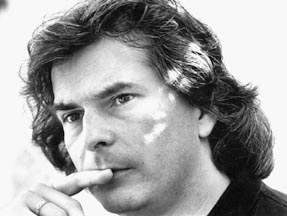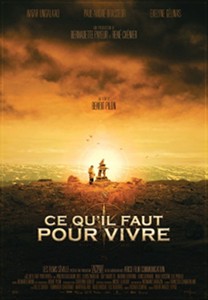
Nanook of the North is a 1922 American silent film which combines elements of documentary and docudrama/docufiction, at a time when the concept of separating films into documentary and drama did not yet exist. In the tradition of what would later be called salvage ethnography, the film follows the struggles of the Inuk man named Nanook and his family in the Canadian Arctic. It is written and directed by Robert J. Flaherty, who also served as cinematographer, editor, and producer.

Robert Joseph Flaherty, was an American filmmaker who directed and produced the first commercially successful feature-length documentary film, Nanook of the North (1922). The film made his reputation and nothing in his later life fully equaled its success, although he continued the development of this new genre of narrative documentary with Moana (1926), set in the South Seas, and Man of Aran (1934), filmed in Ireland's Aran Islands. Flaherty is considered the father of both the documentary and the ethnographic film.

Georges-Henri Denys Arcand is a French Canadian film director, screenwriter and producer. His film The Barbarian Invasions won the Academy Award for Best Foreign Film in 2004. His films have also been nominated three further times, including two nominations in the same category for The Decline of the American Empire in 1986 and Jesus of Montreal in 1989, becoming the only French-Canadian director in history whose films have received this number of nominations and, subsequently, to have a film win the award. For The Barbarian Invasions, he received an Academy Award nomination for Best Original Screenplay, losing to Sofia Coppola for Lost in Translation.

Don McKellar is a Canadian actor, writer, playwright, and filmmaker. He was part of a loosely-affiliated group of filmmakers to emerge from Toronto known as the Toronto New Wave.
The John Dunning Best First Feature Award is a special Canadian film award, presented by the Academy of Canadian Cinema and Television to the year's best feature film by a first-time film director. Under the earlier names Claude Jutra Award and Canadian Screen Award for Best First Feature, the award has been presented since the 14th Genie Awards in 1993.

Thomas "Thom" Fitzgerald is an American-Canadian film and theatre director, screenwriter, playwright and producer.

Jean-Claude Lauzon was a Canadian filmmaker and screenwriter. Born to a working class family in Montreal, Quebec, Lauzon dropped out of high school and worked various jobs before studying film at the Université du Québec à Montréal. His two feature-length films, Night Zoo (1987) and Léolo (1992), established him as one of the most important Canadian directors of his generation. American film critic Roger Ebert wrote that "Lauzon is so motivated by his resentments and desires that everything he creates is pressed into the cause and filled with passion."

The Necessities of Life is a 2008 Canadian drama film directed by Benoît Pilon and starring Natar Ungalaaq, Éveline Gélinas and Paul-André Brasseur. Told in both French and Inuktitut, the film is about an Inuit man who is sent to Quebec for tuberculosis treatment.

Natar Ungalaaq is a Canadian Inuit actor, filmmaker and sculptor whose work is in many major collections of Inuit art. Before playing the lead roles in Atanarjuat: The Fast Runner (2001) and The Necessities of Life (2008), Ungalaaq played major roles in other Canadian and American films, including Kabloonak (1995), Glory & Honor (1998) and Frostfire (1994). He is also a producer and director of the Inuit Broadcasting Corporation.

Bernard Émond is a Canadian director, screenwriter, novelist and essayist working in the French-language. He studied anthropology at university and lived for several years in the Canadian north where he worked for the Inuit Broadcasting Corporation. He began his film career making documentaries, later moving to feature-length films, all of which have been shot in Quebec. He is noted for the humanistic, sometimes spiritual depth of his films, in particular his trilogy of feature films based on the three Christian virtues, faith, hope, and charity. Other themes in his work include human dignity and frailty, and cultural loss. He describes himself as an agnostic and a "conservative socialist."

Anne Émond is a Canadian film director and screenwriter, currently based in Montreal, Quebec.
Sonatine is a 1984 Canadian drama film written and directed by Micheline Lanctôt. The film was selected as the Canadian entry for the Best Foreign Language Film at the 57th Academy Awards, but was not accepted as a nominee.
Sitting in Limbo is a 1986 Canadian docudrama film directed by John N. Smith. Developed through interviews and improvisational work with a group of Black Canadian youth in Montreal, the film stars Pat Dillon as Pat, a young woman who moves in with her boyfriend Fabian after getting pregnant.
Tar Angel is a Canadian drama film, released in 2001.
François Protat was a Canadian cinematographer, who won the Genie Award for Best Cinematography at the 7th Genie Awards in 1986 for Joshua Then and Now. Born in France, he emigrated to Canada in 1969 after studying at the École de photographie de la rue de Vaugirard.

Next Floor is a 2008 Canadian dark comedy short film directed by Denis Villeneuve. The film, largely wordless, depicts a group of eleven people endlessly gorging themselves on raw meats at a banquet.
The Wind from Wyoming is a Canadian black comedy film, directed by André Forcier and released in 1994.
The Novena is a Canadian drama film, directed by Bernard Émond and released in 2005.
Phantom Life is a Canadian drama film, directed by Jacques Leduc and released in 1992. An adaptation of the novel by Danièle Sallenave, the film stars Ron Lea as Pierre, an academic at the Université de Sherbrooke who is torn between his marriage to Annie and his extramarital affair with the younger Laure.
Sylvain Brault is a Canadian cinematographer from Quebec. He is most noted as a two-time Genie Award nominee for Best Cinematography, receiving nods at the 15th Genie Awards in 1994 for My Friend Max , and at the 17th Genie Awards in 1996 for Rowing Through.











